
The jig is a form of lively folk dance in compound metre, as well as the accompanying dance tune. It first gained popularity in 16th-century England, Ireland, Scotland, and other parts of the British Isles, and was adopted on mainland Europe where it eventually became the final movement of the mature Baroque dance suite. Today it is most associated with Irish dance music, Scottish country dance and the Métis people in Canada. Jigs were originally in quadruple compound metre,, but have been adapted to a variety of time signatures, by which they are often classified into groups, including double jigs, slip jigs and single jigs.

Irish dance refers to the traditional dance forms that originate in Ireland, including both solo and group dance forms, for social, competitive, and performance purposes. Irish dance in its current form developed from various influences such as earlier native Irish dance, English country dancing and later possibly French quadrilles, as it became popular in Britain and Ireland during the 19th century. Dance was taught by "travelling dance masters" across Ireland in the 17th and 18th centuries, and separate dance forms developed according to regional practice and differing purposes. Irish dance became a significant part of Irish culture, particularly for Irish nationalist movements. From the early 20th century, a number of organisations promoted and codified the various forms of dance, creating competitive structures and standardised styles. Irish dancers who compete for competitive reasons dance in a dance style that is more modern than traditional Irish dance. It is mainly done solo, but there is some team dancing in groups of 2, 3, 4, 6, 8, 10, 16 and even numbers onwards.

Step dance is a generic term for dance styles in which footwork is considered to be the most important part of the dance and limb movements and styling are either restricted or considered irrelevant.

Slip jig refers to both a style within Irish music, and the Irish dance to music in slip-jig time originating from England. The slip jig is in 9
8 time, traditionally with accents on 5 of the 9 beats — two pairs of crotchet/quaver followed by a dotted crotchet note.

A fishing lure is any one of a broad category of artificial angling baits that are inedible replicas designed to mimic prey animals that attract the attention of predatory fish, typically via appearances, flashy colors, bright reflections, movements, vibrations and/or loud noises which appeal to the fish's predation instinct and entice it into gulping the lure. Angling activities using lures are known as lure fishing.

A fife and drum corps is a musical ensemble consisting of fifes and drums. In the United States of America, fife and drum corps specializing in colonial period impressions using fifes, rope tension snare drums and rope tension bass drums are known as Ancient Fife and Drum Corps. Many of these ensembles originated from a type of military field music.

Labour Day is a 1988 album by Spirit of the West.

Tripping Up the Stairs is the second studio album by Canadian folk rock group Spirit of the West, released in July 1986 by Stony Plain Records.

Great Big Sea is the self-titled debut album by Canadian folk-rock band Great Big Sea released in 1993. Originally released in 1993, it was later redistributed by Warner Music Canada when the band was signed.

Threads of Time, an album by Cherish the Ladies, was released in 1998 on the RCA label.
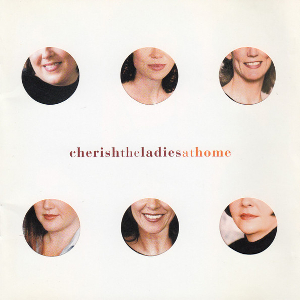
At Home is an album by Irish-American folk group Cherish the Ladies that was released in 1999 on the RCA label. It contains a combination of traditional Irish folk songs, such as the Irish language "Is Fada Liom Uaimí Uaimí," and purely instrumental numbers, including jigs, reels, and airs. Bobby and Liam Clancy of The Clancy Brothers made guest appearances on the album. One of the members of Cherish the Ladies, Aoife Clancy, was the daughter of Bobby and the niece of Liam. Her brother, Finbarr Clancy, sings with them on "John o' Dreams," while her cousin Dónal Clancy accompanies them on guitar. This was the second-to-last album on which any of the Clancy Brothers appeared together.

Téada, an Irish band, plays traditional music. Téada is Irish for "strings". The five members of the band are fiddle player Oisín Mac Diarmada, button accordion player Paul Finn, Damien Stenson performs on flute, Seán Mc Elwain switches between the bouzouki and guitar and bodhrán player Tristan Rosenstock.
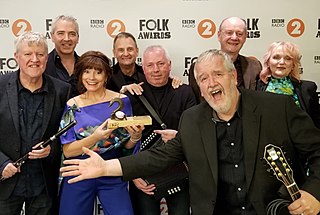
Dervish is an Irish traditional music group from County Sligo, Ireland which has been described by BBC Radio 3 as "an icon of Irish music". They were formed in 1989 by Liam Kelly, Shane Mitchell, Martin McGinley, Brian McDonagh, and Michael Holmes and have been fronted by singer Cathy Jordan since 1991. They represented Ireland in the final of the Eurovision Song Contest 2007, singing a song written by John Waters and Tommy Moran. In 2019 they released an album on the US Rounder Records label called The Great Irish Song Book featuring a selection of classic Irish songs sung by a number of well known singers including Steve Earle, Andrea Corr, Vince Gill, Kate Rusby, Imelda May, Rhiannon Giddens, The Steel Drivers, Brendan Gleeson, Abigail Washburn, and Jamey Johnson. In 2019 they received a lifetime achievement award from the BBC.

Plugs are a popular type of hard-bodied fishing lure, characterized by a specially designed foil at the front end known as the bill or lip. Plugs are widely known by a number of other names depending on the country and region, including crankbait, wobbler, minnow, shallow-diver and deep-diver. The term minnow is usually used for long, slender, lures that imitate baitfish, while the term plug is usually used for shorter, deeper-bodied lures which imitate deeper-bodied fish, frogs and other prey. Shallow-diver and deep-diver refer to the diving capabilities of the lure, which depends on the size and angle of the lip, and lure buoyancy.
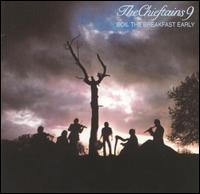
The Chieftains 9: Boil the Breakfast Early is an Irish folk album by The Chieftains. This album featured a big change in The Chieftains sound, because two of the founding members, Seán Potts and Michael Tubridy, had left the group. The replacement for Tubridy was Matt Molloy, who had just been a member for both The Bothy Band and Planxty.
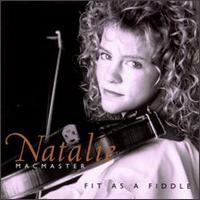
Fit as a Fiddle is an album by Natalie MacMaster. It was reissued by Rounder Records in 1997.

The Best of Patrick Street is the first compilation album by Patrick Street, released in 1995 on the NECTAR label.
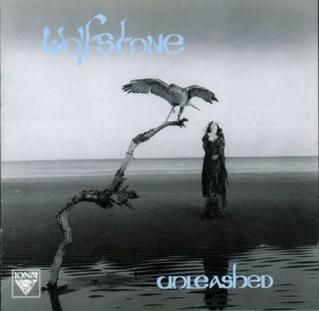
Unleashed is the official debut album of Scottish Celtic rock band Wolfstone. It was released in 1991.

The Lewis Blue is an album by Scottish Celtic musicians Ivan Drever and Duncan Chisholm, released in 1998. At the time, both musicians were members of Wolfstone.

Between the Jigs and the Reels: A Retrospective is a two-disc anthology by the Irish folk band Planxty. It includes a 17-track CD and a 36-track DVD with over two hours of previously unreleased footage (1972–1982) from RTÉ archives.




















